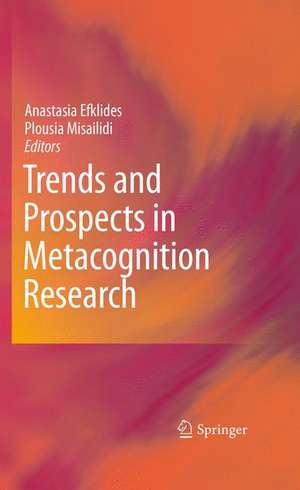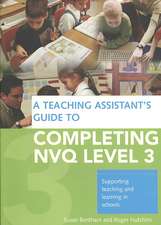Trends and Prospects in Metacognition Research
Editat de Anastasia Efklides, Plousia Misailidien Limba Engleză Hardback – 16 sep 2010
Presenting a new theoretical framework, Trends and Prospects in Metacognition extends the classical definitions offered by Flavell and Nelson to carry the prospect of more integrated work into the future. By opening the possibility to cross the boundaries posed by traditionally independent research areas, this volume provides a foundation for the integration of research paradigms and concepts and builds on the relationship between metacognition and consciousness, while integrating basic with applied research.
| Toate formatele și edițiile | Preț | Express |
|---|---|---|
| Paperback (1) | 953.65 lei 6-8 săpt. | |
| Springer Us – 19 noi 2014 | 953.65 lei 6-8 săpt. | |
| Hardback (1) | 959.98 lei 6-8 săpt. | |
| Springer Us – 16 sep 2010 | 959.98 lei 6-8 săpt. |
Preț: 959.98 lei
Preț vechi: 1170.71 lei
-18% Nou
Puncte Express: 1440
Preț estimativ în valută:
183.68€ • 191.80$ • 151.69£
183.68€ • 191.80$ • 151.69£
Carte tipărită la comandă
Livrare economică 15-29 aprilie
Preluare comenzi: 021 569.72.76
Specificații
ISBN-13: 9781441965455
ISBN-10: 1441965459
Pagini: 492
Ilustrații: XII, 479 p.
Dimensiuni: 155 x 235 x 35 mm
Greutate: 0.86 kg
Ediția:2010
Editura: Springer Us
Colecția Springer
Locul publicării:New York, NY, United States
ISBN-10: 1441965459
Pagini: 492
Ilustrații: XII, 479 p.
Dimensiuni: 155 x 235 x 35 mm
Greutate: 0.86 kg
Ediția:2010
Editura: Springer Us
Colecția Springer
Locul publicării:New York, NY, United States
Public țintă
ResearchCuprins
Developmental and Educational Implications of Metacognition.- Introduction: The Present and the Future in Metacognition.- Basic Research in Metacognition.- Metacognition in Nonhumans: Methodological and Theoretical Issues in Uncertainty Monitoring.- The Metacognitive Role of Familiarity in Artificial Grammar Learning: Transitions from Unconscious to Conscious Knowledge.- Fringe Consciousness: A Useful Framework for Clarifying the Nature of Experience-Based Metacognitive Feelings.- Further Insight into Cognitive and Metacognitive Processes of the Tip-of-the-Tongue State with an Amnesic Drug as Cognitive Tool.- Prospective Memory Failure and the Metacognitive Experienceof “Blank in the Mind”.- Metamemory in Schizophrenia: Monitoring or Control Deficit?.- The Realism in Children’s Metacognitive Judgments of Their Episodic Memory Performance.- Cognitive Interruption as an Object of Metacognitive Monitoring: Feeling of Difficulty and Surprise.- Tracking On-Line Metacognition: Monitoring and Regulating Comprehension in Reading.- Developmental and Educational Implications of Metacognition.- Metacognition in Young Children: Current Methodological and Theoretical Developments.- Metacognitive Development in Early Childhood: New Questions about Old Assumptions.- Children’s Metacognition and Theory of Mind: Bridging the Gap.- Self-Confidence and Academic Achievements in Primary-School Children: Their Relationships and Links to Parental Bonds, Intelligence, Age, and Gender.- Metacognition and Reading Comprehension: Age and Gender Differences.- Metacognition-Based Reading Intervention Programs Among Fourth-Grade Hungarian Students.- Metacognition and Spelling Performance in College Students.- Computer Use in a Primary School: A Case-Study of Self-Regulated Learning.- University Teachers Engaged in Critical Self-Regulation: How May They Influence Their Students?.- Metacognitive Knowledge of Decision-Making: An Explorative Study.
Recenzii
From the reviews:
"This volume also explores a series of new phenomena, not normally considered in metacognition research. These topics include chapters on the experience of having a “blank mind,” on “fringe consciousness,” and on “feelings of difficulty and surprise.” These topics open new doors to metacognitive research. This creativity of topics extends to the section on development and education. Here, we find metacognition being linked to relationships of children to parents and metacognition in college professors. Of course, we also find standard topics like judgments of learning and tip-of-the-tongue states. But the addition of these novel topics should spur new research. In sum, this is an excellent edited book and well worth the read." (Bennett L. Schwartz, Florida International University, 2010)
"Those in search of a comprehensive, in-depth review of the conceptualization and underlying mechanisms of metacognition—the monitoring and control of cognition—need look no further than Trends and Prospects in Metacognition Research, edited by Anastasia Efklides and Plousia Misailida. With contributions from an international group of authors, the first section of the volume focuses on basic research—the nature and functioning of metacognition—and the second part on developmental and educational implications...This impressive volume describes the convergence of evidence from multiple disciplines, within multiple populations, and demonstrates the complexity of metacognition research. Despite familiarity with some content and issues, new insights are likely for researchers already immersed in the field. Those new to the topic are certain to be impressed and well informed by its scope and lucidly crafted chapters." (Stuart A. Karabenick, University of Michigan, 2010)
"This volume also explores a series of new phenomena, not normally considered in metacognition research. These topics include chapters on the experience of having a “blank mind,” on “fringe consciousness,” and on “feelings of difficulty and surprise.” These topics open new doors to metacognitive research. This creativity of topics extends to the section on development and education. Here, we find metacognition being linked to relationships of children to parents and metacognition in college professors. Of course, we also find standard topics like judgments of learning and tip-of-the-tongue states. But the addition of these novel topics should spur new research. In sum, this is an excellent edited book and well worth the read." (Bennett L. Schwartz, Florida International University, 2010)
"Those in search of a comprehensive, in-depth review of the conceptualization and underlying mechanisms of metacognition—the monitoring and control of cognition—need look no further than Trends and Prospects in Metacognition Research, edited by Anastasia Efklides and Plousia Misailida. With contributions from an international group of authors, the first section of the volume focuses on basic research—the nature and functioning of metacognition—and the second part on developmental and educational implications...This impressive volume describes the convergence of evidence from multiple disciplines, within multiple populations, and demonstrates the complexity of metacognition research. Despite familiarity with some content and issues, new insights are likely for researchers already immersed in the field. Those new to the topic are certain to be impressed and well informed by its scope and lucidly crafted chapters." (Stuart A. Karabenick, University of Michigan, 2010)
Textul de pe ultima copertă
Trends and Prospects in Metacognition Research Anastasia Efklides and Plousia Misailidi, editorsThe mechanisms of metacognition—our knowledge of how we know—have yet to be fully explained, and its development in childhood has yet to be fully understood. Taking as its starting point the discussion about the roots of conscious and unconscious awareness, Trends and Prospects in Metacognition Research clarifies these processes—along with many others—in a stimulating attempt to unite disparate areas of research and theory. The book illuminates both familiar and less frequently studied metacognitive phenomena, bringing new methodologies and fresh challenges to long-held ideas about self-regulation and control, distinctions between cognition and metacognition, the social contexts of children’s learning and metacognition, and the trainability of metacognitive skills. In keeping with its integrative approach, basic and applied research are given equal emphasis as chapters examine research trends most likely to impact the future of the field, including the following: •Metacognition in non-human species.•Tip-of-the-tongue and blank-in-the-mind states.•Fringe consciousness.•Metamemory deficits in schizophrenia.•Metacognition, uncertainty, and confidence among young children.•Teachers’ use of metacognition in the classroom.•Metacognitive knowledge of decision making.Trends and Prospects in Metacognition Research offers researchers in psychology, education, and cognitive science vital new perspectives and insights into their work, with a keen eye toward the future of their rapidly evolving field.
Caracteristici
Synthesizes research in the field; useful reference
Provides methodologies for research
Provides a new theoretical framework for metacognitive research
Includes supplementary material: sn.pub/extras
Provides methodologies for research
Provides a new theoretical framework for metacognitive research
Includes supplementary material: sn.pub/extras










